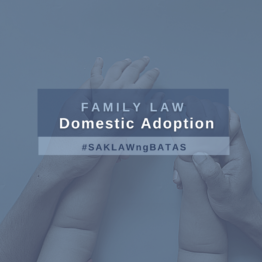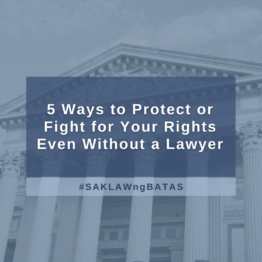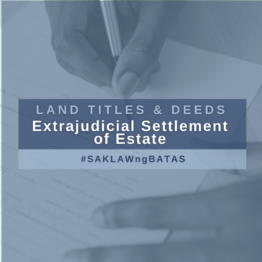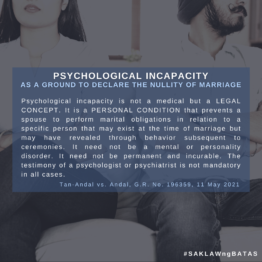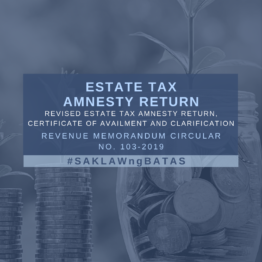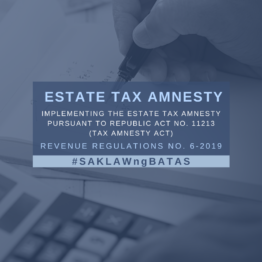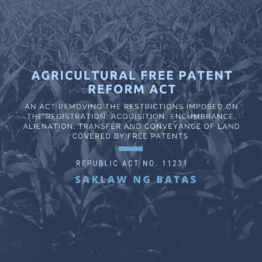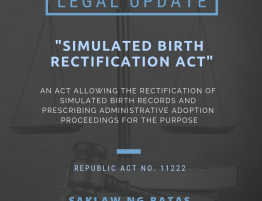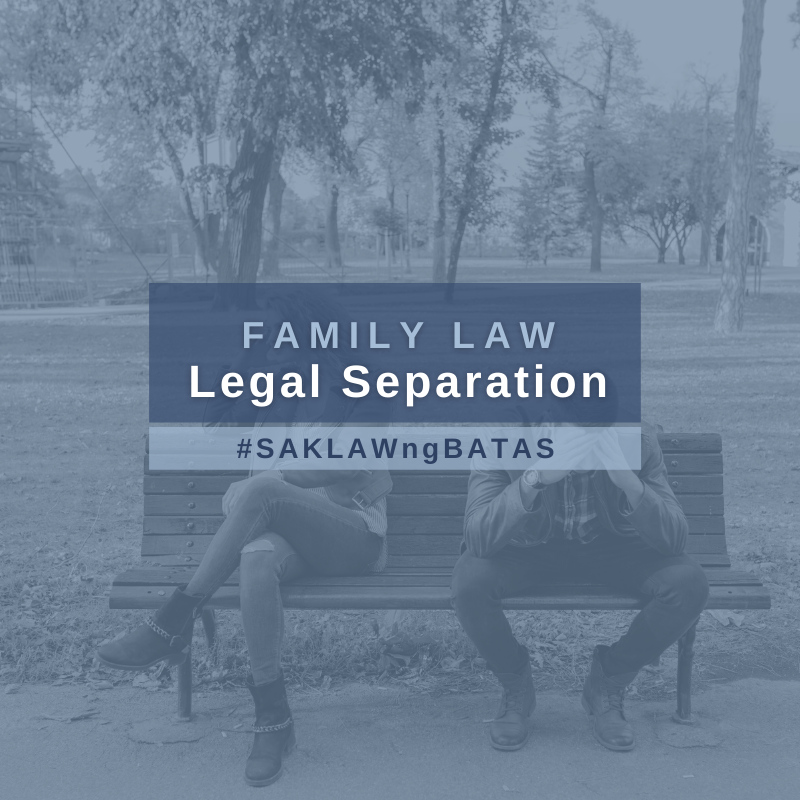
A. Legal Separation, Generally
Legal separation is a legal remedy for couples suffering from a problematic marriage. In legal separation, the couple is allowed to live apart and separately own assets. However, legally separated couples are not permitted to remarry, since their marriage is still considered valid and subsisting. Legal separation dissolves the property relations of the spouses and removes the guilty party’s capacity to inherit from the innocent party. The grounds for legal separation may have arisen after the marriage, and may be filed on the following grounds: (1) repeated physical violence or grossly abusive conduct directed against the petitioner, a common child, or a child of the petitioner; (2) physical violence or moral pressure to compel the petitioner to change religious or political affiliation; (3) attempt of respondent to corrupt or induce the petitioner, a common child, or a child of the petitioner, to engage in prostitution, or connivance in such corruption or inducement; (4) final judgment sentencing the respondent to imprisonment of more than 6 years, even if pardoned; (5) drug addiction or habitual alcoholism of the respondent; (6) lesbianism or homosexuality of the respondent; (7) contracting by the respondent of a subsequent bigamous marriage, whether in the Philippines or abroad; (8) sexual infidelity or perversion; (9) attempt by the respondent against the life of the petitioner; or (10) abandonment of petitioner by respondent without justifiable cause for more than 1 year.
Legal separation is different from the declaration of nullity of marriage applies to marriages that are null and void from the beginning (void ab initio), due to the absence of at least one of the essential or formal requisites of marriages. Legal separation is also different from the annulment of marriage, which considers the marriage valid and existing until it is annulled.
Legal separation is different from judicial separation of property, which is a distinct legal remedy for a party to a marriage seeking to immediately address issues involving their conjugal properties. The grounds for judicial separation of property are: (1) the spouse of the petitioner has been sentenced to a penalty which carries with it civil interdiction; (2) the spouse of the petitioner has been judicially declared an absentee; (3) loss of parental authority of the spouse of petitioner has been decreed by the court; (4) the spouse of the petitioner has abandoned the latter or failed to comply with his or her obligations to the family; (5) the spouse granted the power of administration in the marriage settlements has abused that power; and (6) at the time of the petition, the spouses have been separated in fact for at least 1 year and reconciliation is highly improbable.
Essentially, legal separation affects both person and property, while separation of property affects property relations only. Legal separation cannot be decreed based on the agreement of parties, while separation of property may be effected by agreement of the parties, subject to judicial approval.
B. Effects of Legal Separation
Below are the legal consequences of legal separation:
1. Separation. The spouses shall be entitled to live separately from each other, but the marriage bonds shall not be severed.
2. Property Relations. The absolute community of property (ACP) or the conjugal partnership of gains (CPG), as the case may be, shall be dissolved and liquidated. The court, in the absence of a written agreement between the spouses, shall designate either of them or a third person to administer the absolute community or conjugal partnership property. The administrator appointed by the court shall have the same powers and duties as those of a guardian.
3. Custody of Children. The custody of the minor children shall be awarded to the innocent spouse, but no child under 7 years shall be separated from the mother unless there are compelling reasons.
During the pendency of the action, the custody of children will be governed either by written agreement, or by court order, based on the best interest of the child. The court will apply the following order of preference, both parents jointly: (a) either parent (may consider the choice of child over 7 years) unless such parent is considered unfit, (b) surviving grandparent (if several, then choice of child over 7 years, unless grandparent chosen is unfit/disqualified), (c) eldest brother/sister over 21 unless unfit/disqualified, or (d) any other person deemed suitable by the court.
4. Support. During the pendency of the action, child and spousal support will be governed by either written agreement, or in the absence thereof, from the ACP/CPG. After decree, either parent or both may be ordered by the court to given an amount necessary for support in proportion to resources/means of giver and necessities of the recipient. Spousal support is considered as an advance to be deducted from the share of the spouse supported during liquidation. There may be restitution of spousal support if after decree, the court finds that the person providing support pendente lite is not liable therefor. Please note that a judgment granting support never becomes final. It may be adjusted or modified according to circumstances and the spouse’s financial capability.
5. Succession. The offending spouse shall be disqualified from inheriting from the innocent spouse by intestate succession. Moreover, provisions in favor of the offending spouse made in the will of the innocent spouse shall be revoked by operation of law.
Within 5 years from the time the decree of legal separation has become final, the innocent spouse may revoke the donations made by him or by her in favor of the offending spouse, as well as the designation of the latter as a beneficiary in any insurance policy, even if such designation be stipulated as irrevocable. Alienations, liens and encumbrances registered in good faith before the recording of the complaint for revocation in the registries of property shall be respected. The revocation of or change in the designation of the insurance beneficiary shall take effect upon written notification thereof to the insured.
Please note that in judicial separation of property, the spouses’ mutual obligation to support each other continues. Furthermore, there is no disqualification to inherit, nor revocation of donations or designation as beneficiary in insurance policies, unlike in legal separation.
C. Outline of Steps
Below is a general outline of the steps in an action for legal separation. Please note that in some instances, these steps may not be followed.
1. Preparation of the Petition. The petition shall allege the complete facts constituting the cause of action. It shall state the names and ages of the common children of the parties and specify the regime governing their property relations, as well as the properties involved.
If there is no adequate provision in a written agreement between the parties, the petitioner may apply for a provisional order for spousal support, custody and support of common children, visitation rights, administration of community or conjugal property, and other matters similarly requiring urgent action.
2. Filing of Petition. The petition is filed with the Regional Trial Court. Cases involving marriage and family matters will be raffled only to designated Family Courts. This will take about a week. After the raffle, the petition will be forwarded to the selected court.
The petitioner shall serve a copy of the petition on the Office of the Solicitor General (OSG) and the Office of the City or Provincial Prosecutor (OCP/OPP), within 5 days from the date of its filing and submit to the court proof of such service within the same period.
After the filing of the petition for legal separation, the spouses shall be entitled to live separately from each other.
3. Summons. The court will issue summons one or two weeks after the case is raffled. Where the respondent cannot be located at his given address or his whereabouts are unknown and cannot be ascertained by diligent inquiry, service of summons may, with the permission of the court, be effected upon him by publication once a week for two consecutive weeks in a newspaper of general circulation in the Philippines and in such places as the court may order.
4. Answer. The respondent shall file his answer within 15 days from service of summons, or within 30 days from the last issue of publication in case of service of summons by publication.
5. Cooling-Off Period. An action for legal separation shall in no case be tried before 6 months shall have elapsed since the filing of the petition.
6. Mediation/Reconciliation. No legal separation may be decreed unless the court has taken steps toward the reconciliation of the spouses and is fully satisfied, despite such efforts, that reconciliation is highly improbable.
7. Collusion Hearing. In any case, the court shall order the prosecuting attorney assigned to the case to take steps to prevent collusion between the parties and to take care that the evidence is not fabricated or suppressed.
If the public prosecutor finds that collusion exists, he shall state the basis thereof in his report. The parties shall file their respective comments on the finding of collusion within 10 days from receipt of a copy of the report. The court shall set the report for hearing and if convinced that the parties are in collusion, it shall dismiss the petition.
If the public prosecutor reports that no collusion exists, the court shall set the case for pre-trial. It shall be the duty of the public prosecutor to appear for the State at the pre-trial.
8. Preliminary Hearing/ Pre-Trial Order. The court will hold a preliminary hearing, which requires both parties to attend. A pre-trial order will be issued. Usually the preliminary hearing is called about two to four months after the filing of the petition.
9. Please note that no legal separation shall be based upon a stipulation of facts or a confession of judgment. The petitioner must present his/her evidence on the grounds for legal separation. For the respondent’s part, s/he may raise the following defenses: (1) condonation; (2) consent; (3) connivance; (4) recrimination; (5) collusion; and (6) prescription.
The number witnesses will depend on the case, but usually, one to two witnesses will be enough, if the case is not contested (meaning, the respondent will not object). The witnesses will be the petitioner herself/himself and one collaborating witness.
10. Decision. The Court will then issue an order that the case is submitted for resolution. The decision may be released 30-90 days after the said order is issued.
11. Decree of Legal Separation. The court shall issue the decree of legal separation after: (a) registration of the entry of judgment granting the petition for legal separation in the Civil Registry where the marriage was celebrated and in the Civil Registry where the Family Court is located; and (b) registration of the approved partition and distribution of the properties of the spouses, in the proper Register of Deeds where the real properties are located. The court shall quote in the Decree the dispositive portion of the judgment entered and attach to the Decree the approved deed of partition.
An action for legal separation may be finished from 10 months or several years depending on various factors like the complexity of the case (e.g. properties and custody, support, etc. are heavily contested), availability of the court, witnesses and documentary evidence, and also the place where the petition will be filed.
D. Requirements and Costs
Below is a list of some of the requirements before filing a petition for legal separation:
- NSO copy of marriage certificate of the spouses and birth certificates of the children (obtained within 6 months from the filing of the petition)
- Barangay certificate and Community Tax Certificate evidencing residence over the last 6 months of the province or city where the petition will be filed
- Copy of marriage settlement or pre-nuptial agreement, if any
- Copy of agreement, if any, relating to custody, support, etc.
- Inventory of properties of the spouses and of the ACP or CP (Please see questionnaire or other document request list of the counsel)
- List of witnesses (Please see questionnaire to be provided by the counsel)
- Other documentary or object evidence
The major cost components of an action for legal separation include the following:
- Filing Fee (Under PhP10,000.00, if no properties are involved; higher, if there are properties involved);
- Legal Fees (Acceptance Fee, Pleading Fees, Appearance Fees);
- Costs and Other Charges (call charges, photocopying and other reproduction costs, delivery fees, postage, and other similar items)
Disclaimer: All of the information on this website is provided as general information, not as legal advice, nor as a solicitation for legal services. The information is not provided in the course of an attorney-client relationship between Atty. Salma F. Angkaya-Kuhutan and anyone who views it. Viewers should not rely on the information contained in this website when making decisions regarding legal matters but should consult a qualified attorney for legal advice. You should not act based solely on the information found on this website and are strongly advised to seek the legal opinion of a lawyer.
You may contact the Attorney through the information provided on this website if you are interested in the legal representation, counseling, and related legal services that we provide.

